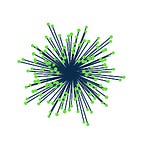Lasting insights, hopes, and challenges
This is the eleventh post for the Community Data Hubs Documentation series. This series will document the thought and conversation trajectories within the process of creating the building blocks of our Community Data Hubs model and OEDP’s broader data stewardship work. The first of these blogs will document the progress of the Community Data Hubs Advisory Group, which is working alongside OEDP to tackle conceptual questions related to the model, including social and technical infrastructures, stewardship, and community data.
This post documents the ninth and final meeting of the Community Data Hubs (CDH) Advisory Group on September 6, 2023. In this meeting, the OEDP team facilitated a conversation on 1) the big insights that stood out for the Advisory Group during the previous sessions, 2) what the group’s hopes were for the CDH project moving forward, and 3) any potential challenges to the project.
Group members started the conversation by voicing what their largest takeaways from the summer sessions were:
- A Community Data Hub relies on community participation and should ultimately be in benefit to that community. Community may mean different things in different contexts, but at their core, they are bound through social, historical, or geographical definitions. What are the foundational aspects of a community to have in place for it to function as a collective that can make decisions and govern common resources? Can a CDH be built in a space where a strong social infrastructure doesn’t already exist?
- Communities might be focused on environmental sensemaking or trying to influence a regulatory process. How could different aspects or modules of the CDH concept support communities on different data journeys?
- There are many blockers to community organization, especially in the US where there is a strong sense of individualism. How can CDH address or grapple with the structural and social challenges of doing work that involves collective decision-making and organization? The CDH model has the potential to create new structures to make communities more resilient and to catalyze conversations about communal use and governance of data.
The conversation shifted to what group members’ hopes were for the project:
- The project documentation could provide traces for future inquiries by other groups exploring environmental data governance and stewardship.
- Projects like CDH could inspire a changing definition of “best available scientific information” to include community-generated data.
- The ideas inspired by the summer Advisory Group sessions could be taken up in broader data governance conversations as a reference; the research component of this work could expand to provide examples of why certain cases go well or could be improved upon.
- This project allows new people to be involved in environmental research and data management, and could help build the potential for new kinds of knowledge around more complex understandings of environmental challenges.
- Communities could build enough capacity to conduct research applying their own perspectives and epistemologies, without needing to rely on external institutions like universities or foundations. This is tied to a broader shift in research norms that center community data and priorities.
The conversation ended with group members discussing what potential challenges the project might face:
- There will be differences in how well some aspects of CDH can be translated and transferred across communities and countries, especially in contrasting legal frameworks.
- Projects like this with so many moving pieces may present trade-offs between various goals, capacities, and eventual outcomes. OEDP should expect the process to be iterative and to sacrifice some pieces in the interest of maintaining strong partnerships and making real impact. We might consider planning for a specific cadence of check-ins during which negotiations could happen.
- Time is always a challenge, and funding often does not reflect the time needed by communities. One group member mentioned the importance of involving people like elders who need to move more slowly, and how slow impactful and positive social change on the community level can often take.
- One group member mentioned the need to recognize how pervasive extractive processes can be in knowledge and data projects, and in environmental research. Acknowledging and responding to those histories might spur us to plan for regular check-ins and strategic reflections to avoid extractive and exploitative relations.
This meeting signaled the conclusion of our biweekly Advisory Group sessions. We’re excited to carry our learnings from these conversations into the next step of the CDH process, which will start with an open call for prospective partners.
Resources mentioned:
- The Undercommons, by Fred Moten and Stefano Harney, explores the concept of the university as an exploitative space.
- The Maintainers, a global research network interested in concepts of maintenance, infrastructure, and repair. They were mentioned as an organization that addresses the challenges surrounding maintenance and community initiatives.
